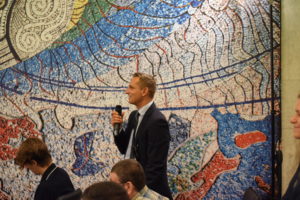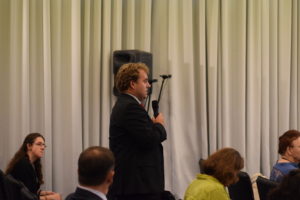Among the residents of Kharkiv the support of the course of Ukraine towards rapprochement with the European Union is gradually increasing, however a significant part of the residents Kharkiv holds “silence” without publicly expressing its foreign policy preferences. This was discussed during a public discussion «Security and Eurointegration in the Eastern Ukraine: Kharkiv Dimension», that was organized by the New Europe Center and Carnegie Europe on 12 September.
The speakers include Balazs Jarabik, Nonresident Scholar at Carnegie Europe, Natalia Shapovalova, Visiting Fellow at Carnegie Europe, Kateryna Zarembo, Deputy Director of the New Europe Center. Sergiy Solodkyy, First Deputy Director of the New Europe Center, and Thomas de Waal, Senior Fellow at Carnegie Europe moderated the discussion.
“East of Ukraine was little different from other regions of our country. Residents of the east feel the same problems as all other Ukrainians, such as corruption”, – noted Natalia Shapovalova.
According to her, in the Kharkiv region, compared with 2014-2015, the security situation is stabilizing, but the tension still persists.
In turn, Katerina Zarembo presented statistical data on foreign policy preferences of Kharkiv residents: “In terms of the foreign policy of Ukraine, Kharkiv residents are divided into three more or less equal groups (about 30%): the first group supports joining the EU, the second group supports the rapprochement with Russia and third group is “silent”. However, those who are “silent”, most likely, do not support European integration”.
Balazs Jarabik drew attention to the main difference between political sentiment in Kharkiv and Donbas: “Residents of Kharkiv are more pro-Kharkiv rather pro-Russian. This is the main difference between Kharkiv and Donbas”.
Volodymyr Fesenko, Chairman of the Board of the Center for Applied Political Studies “Penta”, took part in the discussion as a commentator.
“In Kharkiv the support of the European course of Ukraine is gradually increasing. This, above all, concerns the political and intellectual elites. But political elite has some complexes, because they did not have such influence as Donetsk or the Dnipro elites”, – stressed Volodymyr Fesenko.
Carnegie Europe research paper “How Eastern Ukraine adapts and survives” and NEC policy brief “Silence of Kharkiv. Kharkiv dimension of European integration” was presented at the event.
All photos from the discussion are available at the link













